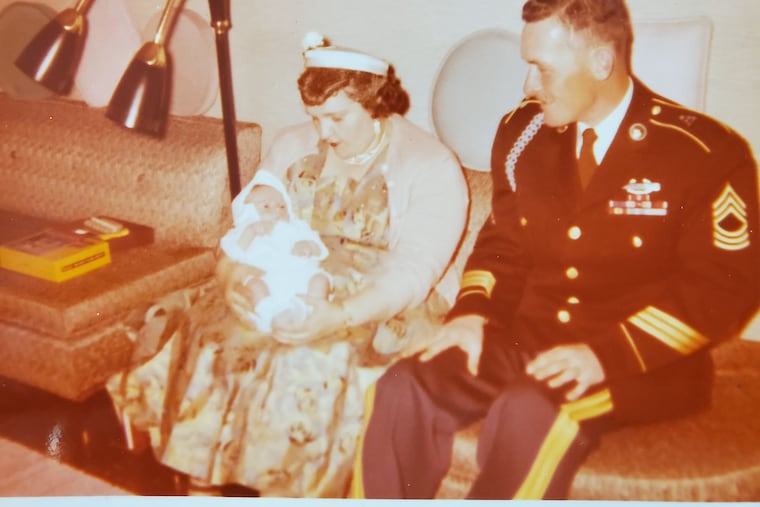A niece’s quest to remember a forgotten hero from a forgotten war
On Veterans Day, a family remembers the sacrifices of a Bronze Star Medal recipient from Philly

Marianne Bustin only has snippets of hazy but golden memories about her uncle, a man the family called Uncle Sarge.
They are the memories told from the perspective of a young girl: She remembers he always wore his Army uniform when he came to their home for a visit. He was kind and nice. He would sing her Army songs.
“Although my uncle remained in the Army and away from Philly, he came home frequently, and he and I spent lots of time together,” Bustin said. Those occasions had such an influence that Bustin joined the Navy, and, as it was for her uncle, it became a career.
But as with so many veterans of the Korean War, a conflict that has been called America’s forgotten war, Master Sgt. Joseph J. Daly’s sacrifice is fading from memory.
And that is what Bustin, now a veteran herself, is working hard to prevent.
Prisoner of war
In July 1950, North Korea invaded South Korea, and the United States found itself in another war. Daly, the oldest son of six children, grew up around Connie Mack Stadium near 22nd Street and Lehigh Avenue. He joined the Army in 1947, right out of high school, and was captured by the enemy in December 1950.
He spent almost the entire war in captivity at Pyok-Dong, a POW camp on the Yalu River, according to the National Archives. Daly rarely talked about his time in captivity. Some family members recalled his stories of being severely tortured, with his fingernails pulled out.
“I have an aunt who said he spoke about it infrequently but eloquently. You know, without anger,” said Bustin. POW accounts revealed the conditions at the camps were horrid, the treatment brutal, and the cold unbearable. Soldiers suffered from starvation, frostbite, dysentery, jaundice, and mental collapse. Almost 40% of captives died.
Returning home
The family suffered for three years not knowing whether he was alive or dead. Only a Christmas card, arriving six months past the holiday, gave them a glimmer of hope that he was still alive.
“My mom said they cried and cried, and they said at least he was alive then,” said Bustin, who was unsure of the year.
More than 5 million soldiers and civilians would die during the conflict, including more than 600 from the Philadelphia five-county region, a fourth of Pennsylvania’s war deaths. Pfc. Stanley A. Gogoj, a Port Richmond man, was the first Philadelphian to die in Korea.
In August 1953, one month after the Korean War ended, Daly’s whole family sat around the radio listening as the announcer read off the list of names of the POWs making their way home. Daly’s name was among the last, but the long-awaited news was delightful. He was alive and coming home.
“Upon his release and return home, the new Kensington neighbors had a block party, and The Philadelphia Inquirer did a story. Some of my uncle’s Army buddies came to welcome him home, and this is where my mom met my dad,” Bustin said. Her father was one of Daly’s Army pals, and her mom was Daly’s sister. Bustin was born 11 years later, in 1964.
Forgotten war, forgotten veterans
She knows Daly continued working in the Army and spent the rest of his life in Germany, where he met and married a woman named Freida. Research showed that two years after repatriation, Korean POWs had a 40% greater death rate than expected from U.S. rates. And the death rate remained significantly higher for 14 years after their release as they still faced ill health that worsened as they aged.
Daly died at age 44 in 1973 — 20 years after being released. “My brother recalled that every time he saw our uncle, he would be more gaunt, more physically unwell. He always thought that’s how being a POW took its toll. I don’t recall that. I was just so glad to see him,” said Bustin.
Bustin, who was in grade school when Daly died, has been on a long quest to get to know her uncle.
“I am looking for information on my Uncle — Joseph J Daly, who was a SGT in the 9th Infantry and held as a POW from 01 Dec 1950-30 Aug 1953. He never spoke to us about that time and has since passed away. I would love to connect some dots with regard to his time served. Thank you,” Bustin wrote to the Korean War Project 20 years ago, one of thousands of people looking for any shred of information about their relatives’ Korean War service.
“A woman called me and told me her husband had served with my uncle, and she wanted to reach out,” said Bustin. But the husband was also dead.
She wishes America would remember how Daly went from being an ordinary guy from Swampoodle to a Bronze Star Medal recipient, the Army’s award for meritorious service or heroic achievement in a combat zone.
She recently applied for and received the Korean Ambassador for Peace Medal on behalf of her uncle, a show of appreciation from the Korean government.
“I wanted so badly to have his sacrifices recognized in some way, and then one day in the mail came just a small congratulatory letter and the medal,” Bustin said. “As I stood there alone with it, a tear rolled down my face. No pomp, no circumstance. It felt less than he deserved.”
By 2030, government estimates are that of the 1.6 million who served in the conflict, only 138,308 Korean War veterans will be alive. And as they die, so do many of the stories of their sacrifices.
“He is a Bronze Star recipient who gave so much to our country,” Bustin said. “He suffered tremendously, both physically and mentally, and he is entitled to so much more.”